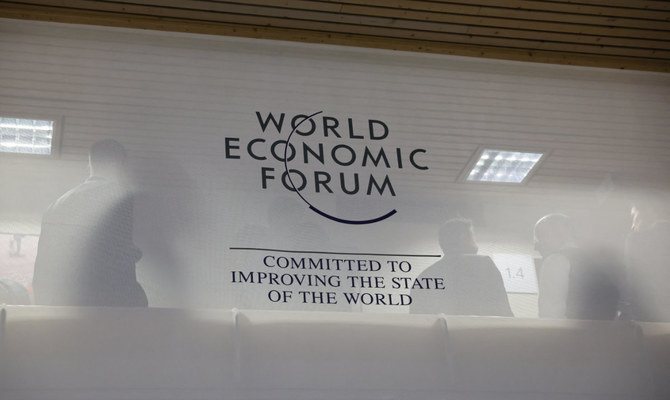DAVOS: Several Arab participants of the World Economic Forum slammed the meeting for its alleged bias towards the Palestinian-Israeli conflict when compared with its response to the Ukraine-Russia war.
A senior Palestinian official told Arab News on Tuesday how the international system has failed the Palestinian people, and that it is nothing new.
Mohammed Mustafa, chairperson of the Palestinian Investment Fund and a former deputy prime minister, was speaking as Israeli President Isaac Herzog arrived in Davos to take part in a “special conversation” with the forum’s founder, Klaus Schwab, and its president, Borge Brende.
In contrast, Mustafa is one of only three high-profile Palestinians invited to Davos; President Mahmoud Abbas is not attending and there are no senior Palestinian diplomats present.
“We always say that there is a double standard in the international system,” Mustafa told Arab News in Davos. “The international system has failed us all the time. It’s nothing new and it just reconfirms it every once in a while.”
Mustafa is joined in Davos by Palestinian business chief Samer C. Khoury and Hisham Shawa, chairman of the Bank of Palestine.
Despite the limited Palestinian presence, Mustafa said: “We are determined to stay the course and to reach our goal. The good news about Davos it that it is an institution. A lot of good people attend … and this is a good opportunity to be able to engage with these people.”
Amal Enan, the chief investment officer at the American University in Cairo and a Young Global Leader, said that while the Gaza issue has been addressed on a global stage at the WEF gathering, she would have hoped to see it addressed more.
She added: "We could have been more vocal as Young Global Leaders as well."
Davos organizers defended the Middle East representation at the forum.
“The serious security and humanitarian situation … will be a key focus of the dialogues this week,” a spokesman said.
“We will be providing a platform for key stakeholders from the region and beyond to share views on how to deescalate and find ways back to diplomacy. Overall, we will have over 50 leaders from the Middle East.”
Mustafa said the world “should not underestimate the size of the humanitarian crisis” in Gaza. More than 350,000 homes had been damaged or destroyed in the territory, he added.
“Even if the war stopped tomorrow, most of these people will not find a place to go back to,” he said. “So before even talking about reconstruction, the question is: how do you deal with the immediate issue of finding a place for these people to live?”
While Mustafa maintained an optimistic approach at the forum, Ukrainian President Volodymyr Zelensky gave an impassioned address to attendees in which he called for support for his country against Russia and its “predator” president.
In 2022, the WEF did not shy away from expressing staunch support for Ukraine. It banned Russian diplomats, oligarchs and business executives from attending the event and even went so far as to turn the former Russia House on the promenade into a Russia War Crimes House.
Many were taken aback by the forum’s critical stance, as it had long been seen as a neutral platform for dialogue and negotiation between warring parties. In his book “From Rulership to Leadership,” Bahraini author and pundit Khalid Janahi asked questions about this unprecedented positioning, in response to which a WEF official said that Russia had breached international law by invading a sovereign country.
When Janahi reminded the official of the presence of the US and UK in Davos despite their unlawful invasion of Iraq in 2003, he was simply told: “The Arabs did not make any noise then.”
At the International Court of Justice in the Hague, Israel is currently facing charges of genocide for its indiscriminate bombing of Gaza, where more than 20,000 civilians have been killed, most of them women and children.
“The issue is that we (the Gulf region and wider Middle East) are irrelevant here. The only relevant people here are the Palestinians,” Janahi told Arab News.
“And while there are a few panels discussing the conflict, they will be focusing on security in Israel and looking at a terrorist Hamas and the Iran-backed militias. Who is speaking for the women and children being killed?”
According to a report in the Wall Street Journal, about 70 percent of the residential buildings and homes in Gaza have been destroyed by the Israeli bombardment. The raids have also damaged churches and mosques, as well as schools, hospitals and other vital healthcare infrastructure.
Of the 36 hospitals in Gaza, only eight are still functioning, at the time of writing, which has created a medical crisis as doctors are forced to perform surgeries in the dark, often without anesthetic.
“Despite its motto, the forum appears to improve the state of the world for some people but definitely not improve it for all people in the world,” Janahi said.


























